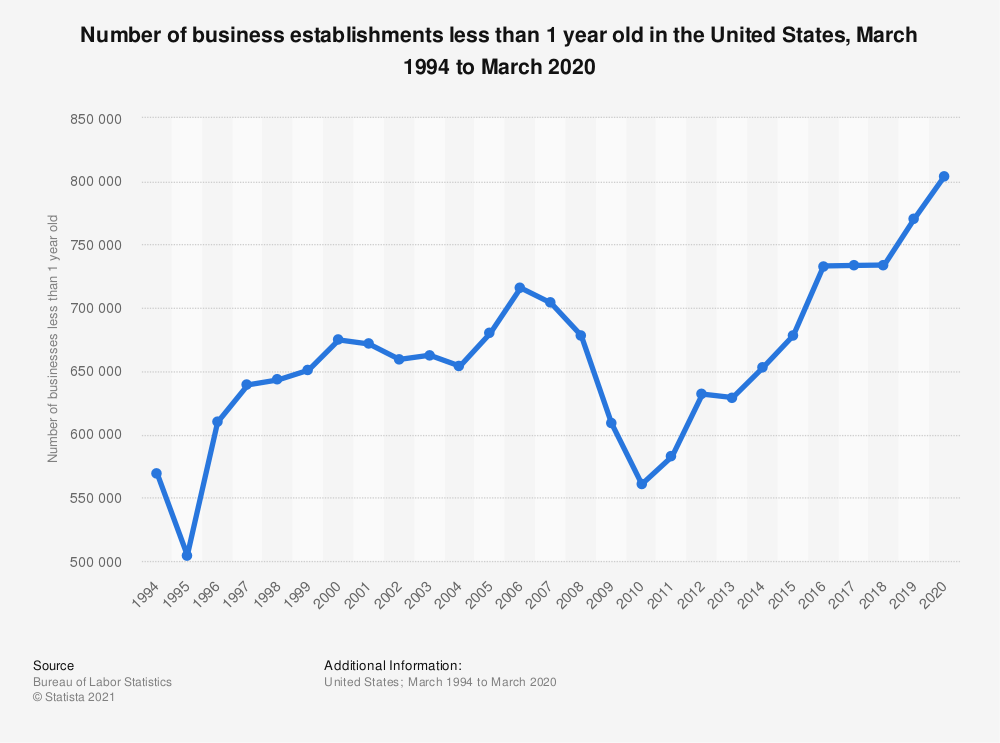The Startup Epidemic
Sep 01, 2021 - 7 min read

Having graduated university right before the onset of the COVID-19 pandemic, the job search process became a far more dire process. Companies were either in limbo waiting to see the effects of the pandemic or laying off employees having been affected by it. However, during this time there was an unexpected boom, the rise of the startups.
It turns out the background of the pandemic was an unexpected fuel for the growth of startups. A startup is how a company goes about trying to build its idea to be a more scalable solution for the masses. It involves coming up with an idea that is ideally a solution to a problem, building the solution, gaining funding, marketing the product and so much more. It is different from small businesses, as small businesses traditionally build to grow and thrive within a certain community but a startup aims to disrupt a more major market to become a bigger more successful company.

Looking at the graph above, it is clear that there was a steady increase in the number of young business establishments since 2010. This upward trajectory continued to March of 2020 despite the increasing number of COVID-19 cases. The pandemic and the lockdowns gave a lot of people a lot of time. This set in motion the spark of ideas that started a new age of startups, one with a familiar goal but structured around the obstacles of the pandemic. Most startups welcomed the “work from home” structure that the pandemic forced everyone into. Where big companies pushed back, startups used this opportunity to maximize development expenses while minimizing the amount spent to rent spaces for their company. The option of meeting remotely allowed for a lot of startups to bloom from the comfort of their home. Another significant factor that propelled the number of startups was the gift of the economic relief bills. Since the pandemic caused major disruptions to economic growth, there were a lot of bills that were passed to ensure that the economy wouldn’t spiral downward. As a result, multiple stimulus checks were given to people, loan programs like the Paycheck Protection Program were established to prevent further loss of jobs and even grants were allocated for small businesses. This allowed existing small businesses to navigate the difficulties of the pandemic but also helped cultivate newer startups and small businesses.
Startups have always been around with individuals starting a company around an idea that could potentially be the next big thing, however, it was in the context of the pandemic that the number of tech startups began exploding. So, as a recent graduate, I jumped at the opportunity of working for a startup to explore the potential and excitement behind it.
What’s all the hype? 🤔
Working at my first startup, it was clear to me that the structure is very different from what a traditional company is. There were far fewer employees, the type of work you do varies, and they have different kinds of compensation. However, the goal of a startup isn’t that different. A startup seeks to develop a product that can disrupt the market and grow into a bigger business. So our goal was to develop a minimum viable product that we can release to test the market and see how well the product is received. This is generally an accelerated process to build all the functionality with as many features as needed for an initial release. Although this was a very intense process, I was able to learn more about multiple different tech frameworks. We worked in small teams which allowed us to implement creative solutions with very few limitations. During my experience working for two startups, it was evident that the expectation was to do my very best in the role, but at the same time, I had the mobility to wear many different hats and got to help out in areas that were out of the scope of my initial role. I found this to be exhilarating and it was a challenge that expanded my knowledge on not only the technical aspects of the business but also the fundamental aspects that make a business successful.
Lessons learned ✍️
Although I don’t have a lot of experience working for big companies, I feel my time with both TrophyTracks and Sparc Agency has taught me a lot about startups. Comparing my experiences with both startups and other companies, it stands to reason that not every startup is the same nor is every big company. Working with a startup is inherently risky as you are working towards getting the startup off the ground and trying to propel it to be a bigger more successful business. Not all startups have the funding, resources, and manpower to build out their ideas. However, this does not always tend to be the case and that is how you end up with certain unicorn startups that navigate their way through the process. So it is important that when working for a startup you want to be certain that it is something you want to do and is a business that interests you. I was fortunate enough to not only meet one but two great entrepreneurs that have been encouraging mentors to me during my time at both startups. It was important to me that the companies I worked for had trustworthy founders with well-established strategies in running their companies. Working with TrophyTracks, I was able to build the application from the ground up and got to own the process of development. I was able to lead a team and gain valuable experience that helped me grow as an individual and as an entrepreneur. Similarly, at Sparc Agency, I contribute by offering my technical skills to develop the end product without being pigeonholed to just my role as a developer. I offer thoughts on different aspects of the company and have the privilege of having one on ones with my founder where I learn about different aspects of programming within and outside the bounds of my work. My time at both startups has offered me a sense of ownership, a lot of lessons learned, and the mindset of a leader.

Although startups do offer a lot of opportunities to learn, it also has its drawbacks. For instance, a startup is only worth something once it has a proven and tested business model. ‘Til that point, any startup is just another startup and nothing more. It takes a lot of time and effort to validate the startup in the market to establish itself as a tried and true business and sometimes that can take years. Therefore, you have to be dedicated to the work you do in a startup and hope it pays off in the long run. Since startups can be time-intensive, you want to ensure you have a balance between your work and your life. I currently work for two different startups and I can tell you first hand, it gets to be difficult!
Startups are indeed risky ventures but there is a lot of room for growth and development. The time you spent at a startup ends up being what you make of it. You have the opportunity to learn multiple different aspects of the business from building the product to marketing it to the end-user and that can be a challenge. But at the end of the day, it matters if you are up for the challenge and if you want to risk working for a company that might not even succeed. For me, having just graduated, I was ready to jump into the world of startups.